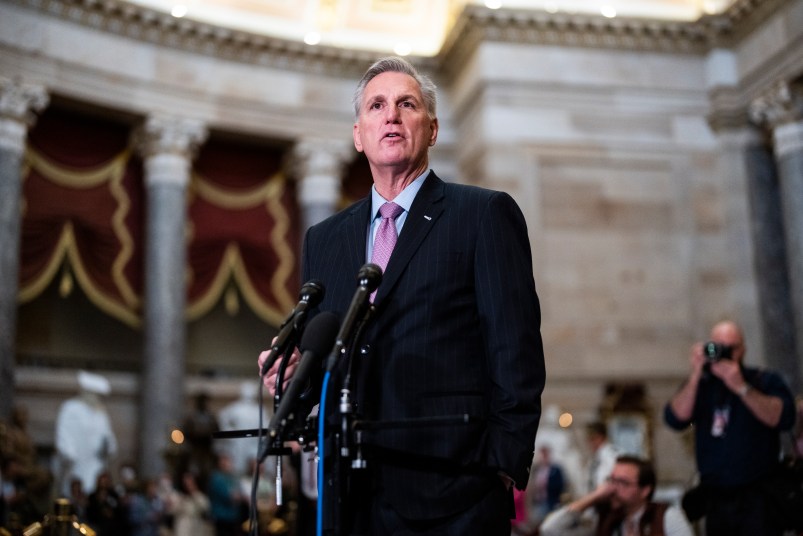It appears Senate Republicans don’t want to touch House Republicans’ plans to hold the debt ceiling hostage with a 10-foot pole.
As new House Speaker Kevin McCarthy (R-CA) and the rest of his caucus threaten to breach the debt limit if they don’t get their way on spending cuts to vital programs like Medicare and Social Security, Senate Republicans are making it clear that this is a McCarthy problem.
A handful of Senate GOPers helped raise the debt ceiling twice in 2021. Four of those members told Politico on Monday they are staying out of it this time around to let House Speaker Kevin McCarthy (R-CA) and House Republicans figure out their own mess. Senate Republicans also just tackled negotiations on a very separate but complex omnibus spending package that keeps the government funded until September, making upper chamber Republicans hesitant to get involved in the House GOP’s hostage taking, Politico reported.
“What matters is really what the House can create,” said Sen. Thom Tillis (R-NC). “They’re in a position, they have the gavels. We have to see what sort of strategy they think works to a successful outcome.”
“I don’t think he could get it, personally, right now. I think he squeezed all that he could to get the omnibus done, as well as it went,” said Sen. Kevin Cramer (R-ND), referring to the spending bills passed in December.
“I don’t want to say hard feelings, but people feel the cost of that,” Cramer added. “And I don’t think they’re going to be ready to take another bullet, if you will.”
President Biden and McCarthy are expected to soon meet to discuss an approach to lifting the debt ceiling, though McCarthy has made it clear that his caucus is committed to tying the party’s unrelated federal spending angst to debt-limit talks. And it is unclear when the two would meet, as Biden and McCarthy’s approach to how they want to move forward continues to be starkly different.
This comes after President Biden said, “We’re going to have a little discussion on that,” at a White House event with mayors last Friday. “If we don’t meet our national debt and renege for the first time, we have a calamity that exceeds anything that’s ever happened financially in the United States.”
McCarthy tweeted shortly afterward that he would accept a request to meet “and discuss a responsible debt ceiling increase to address irresponsible government spending.”
The White House then responded in a statement, reiterating their stance that “raising the debt ceiling is not a negotiation; it is an obligation of this country and its leaders to avoid economic chaos.”
Senate Minority Whip John Thune (R-S.D) summed up upper chamber Republicans’ stance on the back-and-forth succinctly: it’s a them problem.
“In the end it’s going to have to be something that House Republicans and the president agree on. Let’s see what they can figure out. That’s the best strategy for us,” he said, per Politico.
On Monday, Senate Majority Leader Chuck Schumer (D-NY) joined the White House in its criticism of House Republicans’ “brinkmanship” and “hostage taking” in the fight over the debt limit. The majority leader dared the House GOP to actually spell out the unpopular spending cuts they are proposing as a part of a debt ceiling deal.
“The new rules that they adopted require them to bring a proposal to the floor of the House and show the American people precisely what kind of cuts they want to make,” Schumer continued. “If Republicans are talking about draconian cuts, they have an obligation to show Americans what those cuts are and let the public react. … Does that mean cuts to Social Security or Medicare or child care or Pell Grants?”
Last Thursday, the U.S. reached its $31.4 debt limit, leading the Treasury Department to start implementing “extraordinary measures” to pay its bills. The Treasury Department has not yet laid out an exact date on when the debt ceiling needs to be lifted to avoid a default but estimates suggest that’ll happen in early June.



